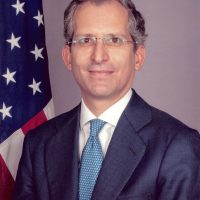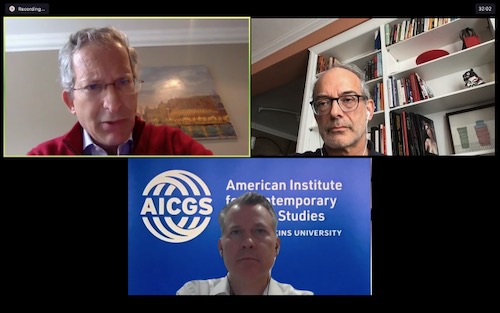Episode 27: EU-U.S. Relations: Messy but Valuable

Anthony Luzzatto Gardner
Former U.S. Ambassador to the European Union
Anthony Luzzatto Gardner was the Ambassador of the U.S. to the European Union from 2014 to 2017.

Jeff Rathke
President of AGI
Jeffrey Rathke is the President of the American-German Institute in Washington, DC.
Prior to joining AGI, Jeff was a senior fellow and deputy director of the Europe Program at CSIS, where his work focused on transatlantic relations and U.S. security and defense policy. Jeff joined CSIS in 2015 from the State Department, after a 24-year career as a Foreign Service Officer, dedicated primarily to U.S. relations with Europe. He was director of the State Department Press Office from 2014 to 2015, briefing the State Department press corps and managing the Department's engagement with U.S. print and electronic media. Jeff led the political section of the U.S. Embassy in Kuala Lumpur from 2011 to 2014. Prior to that, he was deputy chief of staff to the NATO Secretary General in Brussels. He also served in Berlin as minister-counselor for political affairs (2006–2009), his second tour of duty in Germany. His Washington assignments have included deputy director of the Office of European Security and Political Affairs and duty officer in the White House Situation Room and State Department Operations Center.
Mr. Rathke was a Weinberg Fellow at Princeton University (2003–2004), winning the Master’s in Public Policy Prize. He also served at U.S. Embassies in Dublin, Moscow, and Riga, which he helped open after the collapse of the Soviet Union. Mr. Rathke has been awarded national honors by Estonia, Latvia, and Lithuania, as well as several State Department awards. He holds an MPP degree from Princeton University and BA and BS degrees from Cornell University. He speaks German, Russian, and Latvian.
__

Peter S. Rashish
Vice President; Director, Geoeconomics Program
Peter S. Rashish, who counts over 30 years of experience counseling corporations, think tanks, foundations, and international organizations on transatlantic trade and economic strategy, is Vice President and Director of the Geoeconomics Program at AICGS. He also writes The Wider Atlantic blog.
Mr. Rashish has served as Vice President for Europe and Eurasia at the U.S. Chamber of Commerce, where he spearheaded the Chamber’s advocacy ahead of the launch of the Transatlantic Trade and Investment Partnership. Previously, Mr. Rashish was a Senior Advisor for Europe at McLarty Associates, Executive Vice President of the European Institute, and a staff member and consultant at the International Energy Agency, the World Bank, UN Trade and Development, the Atlantic Council, the Bertelsmann Foundation, and the German Marshall Fund.
Mr. Rashish has testified before the House Financial Services Subcommittee on International Monetary Policy and Trade and the House Foreign Affairs Subcommittee on Europe and Eurasia and has advised three U.S. presidential campaigns. He has been a featured speaker at the Munich Security Conference, the Aspen Ideas Festival, and the European Forum Alpbach and is a member of the Board of Directors of the Jean Monnet Institute in Paris and a Senior Advisor to the European Policy Centre in Brussels. His commentaries have been published in The New York Times, the Financial Times, The Wall Street Journal, Foreign Policy, and The National Interest, and he has appeared on PBS, CNBC, CNN, NPR, and the BBC.
He earned a BA from Harvard College and an MPhil in international relations from Oxford University. He speaks French, German, Italian, and Spanish.
The European Union is one of the world’s most important but least understood international bodies. It is simultaneously many things: a collection of institutions, including an executive administration (the European Commission) with many of the authorities of a national government; a treaty-based organization with a supreme judicial body (the European Court of Justice); and a coordination mechanism for leaders of 27 countries who exert their national power and exercise diplomacy to shape Europe’s response to internal and external challenges. The inter-governmental aspect of the EU often dominates—when a powerful group of national leaders wants to make something happen, they usually find a way. The European Union is a continuously evolving phenomenon, which over time has gained new and expanded powers in reaction to crises.
The EU is a valuable partner for the United States, and it is at times a frustrating counterpart, because of its diffuse power centers and differences among its member states. For many in the United States and elsewhere, the EU is a green screen onto which you can project your preconceived notions of how the world works: If you favor international collaboration, you see the EU in some ways as an ideal—a post-national beacon for mutual prosperity, a single market, and political solidarity. If you are skeptical about anything that constrains national action, the EU is the apotheosis of globalism that can thwart national sovereignty and the democratically expressed will of a country’s citizens.

On this episode of The Zeitgeist, AGI’s Jeff Rathke and Peter Rashish speak with Anthony Gardner, who served as U.S. Ambassador to the European Union from 2014 to 2017. He is also the author of Stars with Stripes: The Essential Partnership between the European Union and the United States. Amb. Gardner shares his reflections on the EU with a focus on Germany and the German-American relationship. What is the role of the EU member states, and of Germany in particular, as part of this big, complicated, but also productive and valuable transatlantic relationship?
Host
Jeff Rathke, President, AGI
Guests
Anthony Gardner, Former U.S. Ambassador to the European Union
Peter Rashish, Senior Fellow and Director, Geoeconomics Program, AGI





